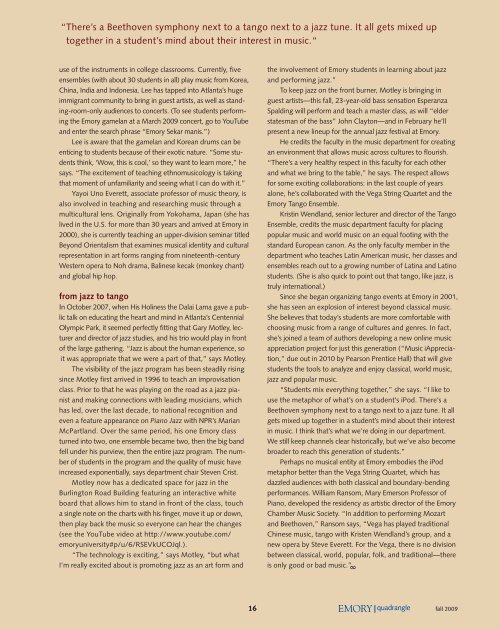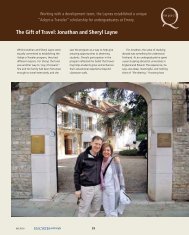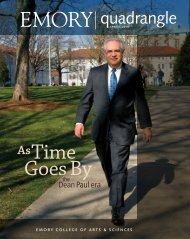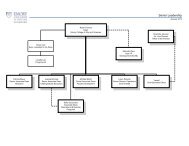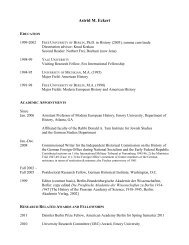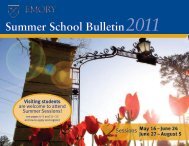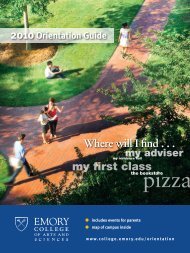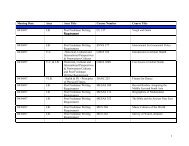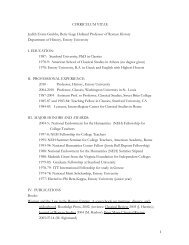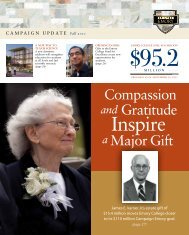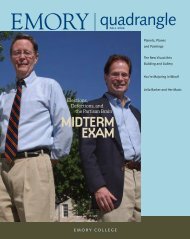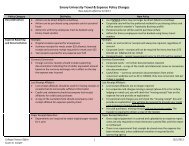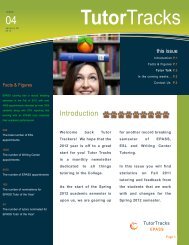quadrangle - Emory College - Emory University
quadrangle - Emory College - Emory University
quadrangle - Emory College - Emory University
- No tags were found...
Create successful ePaper yourself
Turn your PDF publications into a flip-book with our unique Google optimized e-Paper software.
“There’s a Beethoven symphony next to a tango next to a jazz tune. It all gets mixed uptogether in a student’s mind about their interest in music.“use of the instruments in college classrooms. Currently, fiveensembles (with about 30 students in all) play music from Korea,China, India and Indonesia. Lee has tapped into Atlanta’s hugeimmigrant community to bring in guest artists, as well as standing-room-onlyaudiences to concerts. (To see students performingthe <strong>Emory</strong> gamelan at a March 2009 concert, go to YouTubeand enter the search phrase “<strong>Emory</strong> Sekar manis.”)Lee is aware that the gamelan and Korean drums can beenticing to students because of their exotic nature. “Some studentsthink, ‘Wow, this is cool,’ so they want to learn more,” hesays. “The excitement of teaching ethnomusicology is takingthat moment of unfamiliarity and seeing what I can do with it.”Yayoi Uno Everett, associate professor of music theory, isalso involved in teaching and researching music through amulticultural lens. Originally from Yokohama, Japan (she haslived in the U.S. for more than 30 years and arrived at <strong>Emory</strong> in2000), she is currently teaching an upper-division seminar titledBeyond Orientalism that examines musical identity and culturalrepresentation in art forms ranging from nineteenth-centuryWestern opera to Noh drama, Balinese kecak (monkey chant)and global hip hop.from jazz to tangoIn October 2007, when His Holiness the Dalai Lama gave a publictalk on educating the heart and mind in Atlanta’s CentennialOlympic Park, it seemed perfectly fitting that Gary Motley, lecturerand director of jazz studies, and his trio would play in frontof the large gathering. “Jazz is about the human experience, soit was appropriate that we were a part of that,” says Motley.The visibility of the jazz program has been steadily risingsince Motley first arrived in 1996 to teach an improvisationclass. Prior to that he was playing on the road as a jazz pianistand making connections with leading musicians, whichhas led, over the last decade, to national recognition andeven a feature appearance on Piano Jazz with NPR’s MarianMcPartland. Over the same period, his one <strong>Emory</strong> classturned into two, one ensemble became two, then the big bandfell under his purview, then the entire jazz program. The numberof students in the program and the quality of music haveincreased exponentially, says department chair Steven Crist.Motley now has a dedicated space for jazz in theBurlington Road Building featuring an interactive whiteboard that allows him to stand in front of the class, toucha single note on the charts with his finger, move it up or down,then play back the music so everyone can hear the changes(see the YouTube video at http://www.youtube.com/emoryuniversity#p/u/6/RSEVkUCOJql.).“The technology is exciting,” says Motley, “but whatI’m really excited about is promoting jazz as an art form andthe involvement of <strong>Emory</strong> students in learning about jazzand performing jazz.”To keep jazz on the front burner, Motley is bringing inguest artists—this fall, 23-year-old bass sensation EsperanzaSpalding will perform and teach a master class, as will “elderstatesman of the bass” John Clayton—and in February he’llpresent a new lineup for the annual jazz festival at <strong>Emory</strong>.He credits the faculty in the music department for creatingan environment that allows music across cultures to flourish.“There’s a very healthy respect in this faculty for each otherand what we bring to the table,” he says. The respect allowsfor some exciting collaborations: in the last couple of yearsalone, he’s collaborated with the Vega String Quartet and the<strong>Emory</strong> Tango Ensemble.Kristin Wendland, senior lecturer and director of the TangoEnsemble, credits the music department faculty for placingpopular music and world music on an equal footing with thestandard European canon. As the only faculty member in thedepartment who teaches Latin American music, her classes andensembles reach out to a growing number of Latina and Latinostudents. (She is also quick to point out that tango, like jazz, istruly international.)Since she began organizing tango events at <strong>Emory</strong> in 2001,she has seen an explosion of interest beyond classical music.She believes that today’s students are more comfortable withchoosing music from a range of cultures and genres. In fact,she’s joined a team of authors developing a new online musicappreciation project for just this generation (“Music iAppreciation,”due out in 2010 by Pearson Prentice Hall) that will givestudents the tools to analyze and enjoy classical, world music,jazz and popular music.“Students mix everything together,” she says. “I like touse the metaphor of what’s on a student’s iPod. There’s aBeethoven symphony next to a tango next to a jazz tune. It allgets mixed up together in a student’s mind about their interestin music. I think that’s what we’re doing in our department.We still keep channels clear historically, but we’ve also becomebroader to reach this generation of students.”Perhaps no musical entity at <strong>Emory</strong> embodies the iPodmetaphor better than the Vega String Quartet, which hasdazzled audiences with both classical and boundary-bendingperformances. William Ransom, Mary Emerson Professor ofPiano, developed the residency as artistic director of the <strong>Emory</strong>Chamber Music Society. “In addition to performing Mozartand Beethoven,” Ransom says, “Vega has played traditionalChinese music, tango with Kristen Wendland’s group, and anew opera by Steve Everett. For the Vega, there is no divisionbetween classical, world, popular, folk, and traditional—thereis only good or bad music.”16 fall 2009


